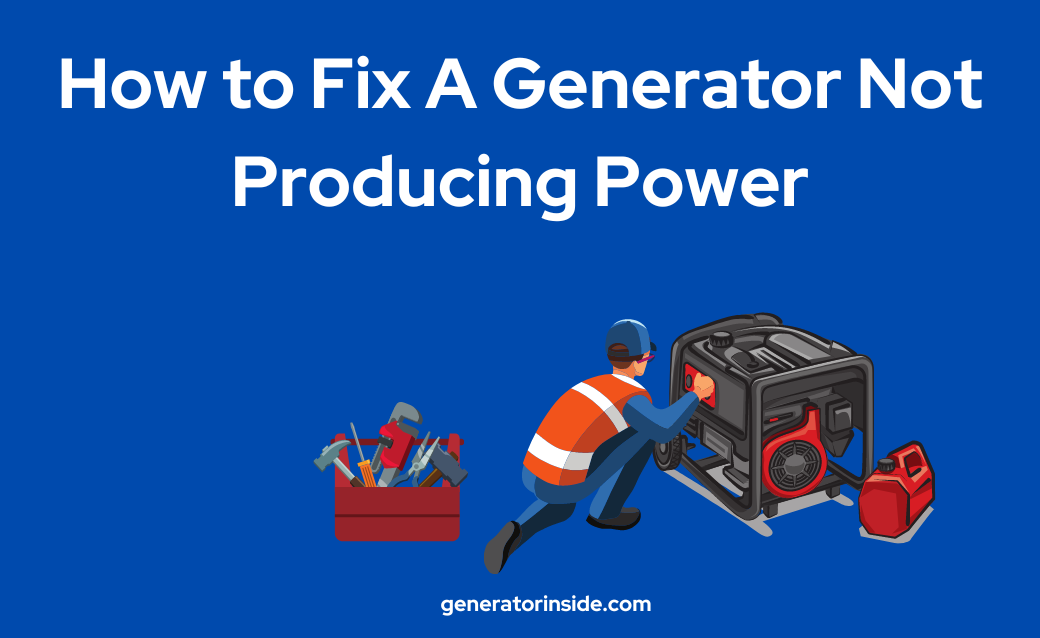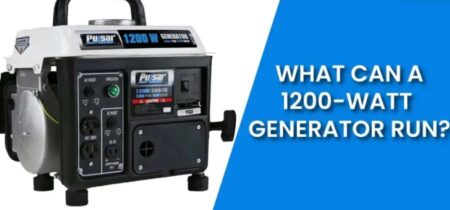
A generator is an important tool that can provide power when there is no electrical supply. However, when a generator is not producing power, it can be frustrating and stressful. There are several reasons why a generator may not be producing power, but fortunately, most of these problems can be fixed without professional help. In this blog post, we will discuss some common reasons why generators may not produce power and provide some solutions on how to fix them, so you can effectively fix a generator not producing power.
Why is my Generator Producing Low Voltage?
There are several reasons why a generator may run but not produce power, but fortunately, most of these problems can be fixed without professional help.
- Malfunctioning Alternator
One of the most common reasons why a generator may run but not produce power is a malfunctioning alternator. The alternator is responsible for converting the mechanical energy produced by the engine into electrical energy that can be used to power appliances and equipment. If the alternator is not working correctly, the generator will run, but it will not produce any power.
- Faulty Voltage Regulator
Another common reason why a generator may run but not produce power is a faulty voltage regulator. The voltage regulator is responsible for regulating the output voltage to the appropriate level. If the voltage regulator is faulty, the generator may run, but it will not produce power.
- A Dirty or Faulty Spark Plug
A dirty or faulty spark plug can also prevent a generator from producing power. The spark plug is responsible for igniting the fuel in the engine to produce power. If the spark plug is dirty or faulty, the engine may run, but it will not produce any power.
- Clogged Air Filter
A clogged air filter can also prevent a generator from producing power. The air filter is responsible for preventing dirt and debris from entering the engine. If the air filter is clogged, it can restrict airflow to the engine, which can prevent the generator from producing power.
- Malfunctioning Circuit Breaker
Lastly, a malfunctioning circuit breaker can also prevent a generator from producing power. The circuit breaker is responsible for protecting the generator from electrical overload. If the circuit breaker is tripped, the generator may run, but it will not produce power.
How to Fix a Generator not Producing Power?
- Check the Fuel Level
The first thing to check when a generator is not producing power is the fuel level. If the generator has run out of fuel, it will not be able to produce power. Check the fuel level and add more fuel if necessary.
- Check the Oil Level
The oil level in the generator should be checked regularly, as low oil levels can cause the generator to stop working. Check the oil level and add more oil if necessary.
- Check the Air Filter
The air filter in the generator can become clogged with dirt and debris, which can prevent the generator from producing power. Remove the air filter and clean it with compressed air or replace it with a new one.
- Check the Spark Plug
The spark plug is an important component of the generator’s engine, as it ignites the fuel to produce power. If the spark plug is dirty or damaged, the generator will not produce power. Remove the spark plug and clean it with a wire brush or replace it with a new one.
- Check the Carburetor
The carburetor in the generator regulates the flow of fuel and air to the engine. If the carburetor is dirty or clogged, it can prevent the generator from producing power. Remove the carburetor and clean it with a carburetor cleaner.
- Check the Generator’s Circuit Breaker
The circuit breaker in the generator is designed to protect the generator from electrical overload. If the circuit breaker has tripped, the generator will not produce power. Reset the circuit breaker and try starting the generator again.
- Check the Voltage Regulator
The voltage regulator in the generator regulates the output voltage to the appropriate level. If the voltage regulator is faulty, the generator will not produce power. Replace the voltage regulator with a new one.
- Check the Alternator
The alternator in the generator is responsible for producing the electrical power. If the alternator is faulty, the generator will not produce power. Remove the alternator and have it tested by a professional or replace it with a new one.
- Check the Wiring
The wiring in the generator can become loose or damaged, which can prevent the generator from producing power. Check the wiring and tighten any loose connections or replace any damaged wiring.
Simply, Regular maintenance of your generator can also help prevent these issues from occurring in the first place. With a little bit of knowledge and effort, you can keep your generator running smoothly and provide the power you need.
Maintenance of Generators to Avoid Problems while Producing Power
Regular maintenance of your generator can help prevent problems from occurring and ensure it functions properly when needed.
One of the most important maintenance tasks for a generator is changing the oil regularly. The oil lubricates the engine and ensures that it runs smoothly. Over time, the oil can become dirty and lose its effectiveness, which can cause the engine to run poorly or even fail. Regular oil changes can help prevent this from happening and ensure that the generator runs smoothly.
Another critical maintenance task for generators is replacing the air filter regularly. The air filter prevents dirt and debris from entering the engine, which can cause damage or reduce its efficiency. A dirty air filter can restrict airflow to the engine, causing it to run poorly or not produce power at all. Replacing the air filter regularly can prevent this from happening and ensure that the generator runs efficiently.
Spark plugs are another essential component of generators that require regular maintenance. The spark plug ignites the fuel in the engine to produce power. If the spark plug is dirty or faulty, it can cause the engine to run poorly or not produce power at all. Regularly checking and replacing the spark plug can help prevent this from happening and ensure that the generator functions correctly.
Regular fuel system maintenance is also crucial for generators. Fuel filters and fuel lines can become clogged with dirt and debris over time, which can reduce the efficiency of the engine and cause it to run poorly. Regularly checking and cleaning the fuel system can help prevent this from happening and ensure that the generator runs efficiently.
Conclusion how to fix a generator not producing power
In conclusion, a generator not producing power can be a frustrating problem, but with proper troubleshooting and maintenance, it can be fixed. Checking the fuel level, air filter, spark plug, circuit breaker, voltage regulator, and alternator can help identify the problem. Cleaning or replacing the air filter, spark plug, and resetting the circuit breaker are simple fixes that can be done at home.
Replacing the voltage regulator or alternator may require professional help. Regular maintenance, such as oil changes, air filter replacement, spark plug replacement, fuel system maintenance, and electrical component inspection, can prevent problems from occurring in the first place. By following these steps, you can ensure that your generator is functioning correctly and providing reliable backup power or powering equipment when needed.
Also Read:
CAN YOU PARALLEL NON INVERTER GENERATORS | GUIDE 2023
HOW TO MAKE A GENERATOR QUIET | 2023 |DETAILED GUIDE
WHAT ARE GENERATOR PLUG TYPES | TOP 8 PICKS IN 2023
HOW TO CONNECT A GENERATOR TO A HOUSE WITHOUT TRANSFER SWITCH








